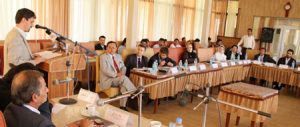As a member of the international community, Afghanistan has some great responsibilities and commitments in respect with human rights. The UN charter requests its member states to apply human rights values through international human rights conventions. Based on this precious substance, the international law and relations of the governments have been developed. The modern governments have considered the human rights values as their working agenda and apart of their foreign policy.
The Afghan government had joined seven international conventions. These conventions include the International Covenant on Civil and Political Rights, the International Covenant on economical, Social & Cultural Rights, the International Convention against Torture, the International Convention on Elimination of All Forms of Discrimination against Women, International Convention for the Protection of Children’s Rights, the International Convention on the Elimination of Racial Discrimination and the International Convention for the protection of the disabled and handicapped. Based on these conventions the Committees of overseeing the implementation of the international conventions had been established that ask the member states for a systematic report.
Afghanistan has experienced various regimes, during the last four decades. During these regimes, as apolitical tool, human rights have been abused and their commitments on accountability and transparency against the international community have not been done.
After the collapse of the Taliban regime, opportunities have been provided for more commitments of the Afghan government toward the international human rights mechanisms. Human Rights have been officially recognized as an important component on the national norms by the new constitution of Afghanistan. Human Right and its relevant international conventions changed into a legal resource and the Afghan government was obliged to provide human rights reports.
Monitoring the human rights situation is one the crucial procedures for promoting human rights values. Monitoring paves the way for identifying human rights violations and provides recommendations and suggestion for their elimination according to that. Besides, based on monitoring the human rights situation, a realistic report on human rights situation can be provided. The report to the international institutions including the UN mechanisms will provide coordination of the international community with the national governments.
In order to promote the culture of reporting of the Afghan government and civil society institutions reports, CSHRN has presented the Educational Manual of International Human Rights Mechanisms. The manual that has been prepared by the working group of the Afghan experts is consisted of the three main parts. The first part, introduces the concepts and UN institutions on Human Rights. The second part involves the role of the states and civil society in respect with reporting the human rights situation. The last part represents the teaching methods of the handbook.
Based on this manual, some groups of instructors from Kabul and other 25 provinces of Afghanistan have been trained by the Civil Society & Human Rights Network of Afghanistan, to generalize the culture of reporting to the international institutions.
After the teacher training program, the participants gathered at «the educational Spring School of on the International Human Rights Mechanisms», to get benefit from the materials of the handbook and discuss their working experiences with each others. The participants of the Educational Spring School discuses with some major institutions, as ministry of foreign affairs, ministry of justice, Independent Human Rights Commission and delegation of the United Nations Assistant Mission in Afghanistan (UNAMA) and shared their knowledge with them.
The Human Rights Spring School provided a better coordination for the government agencies and the Civil Society Institutions on accountability and transparency about Human Rights situation in Afghanistan, and constructive relations with the international Human Rights organizations.
The number of the participants reached to 54 at the mentioned program which lasted for six days, and at the end, the certificates prepared by CSHRN, have been presented to the participants by Mr. M. Naim Nazari, the executive director of CSHRN, Ms. Selay Ghafar, the chairwoman of the board of the network, Mr. Wazir Ahmad Khorami, deputy director of the network, members of the board including Mr. Wodood Pedram, Mr. Abdullah Ahmadi, and the suppliers of the «Educational Manual of the International Human Rights Mechanisms», including Ms. Sediqa Nawrozyan, Ms, Zarqa Yaftaly, Mr. Yahya Ammaar and Ms. Frozan Darwish.
The program was ended up with a live music program by a talented young artist, Mr. Abdullah Milad Kabiri.
